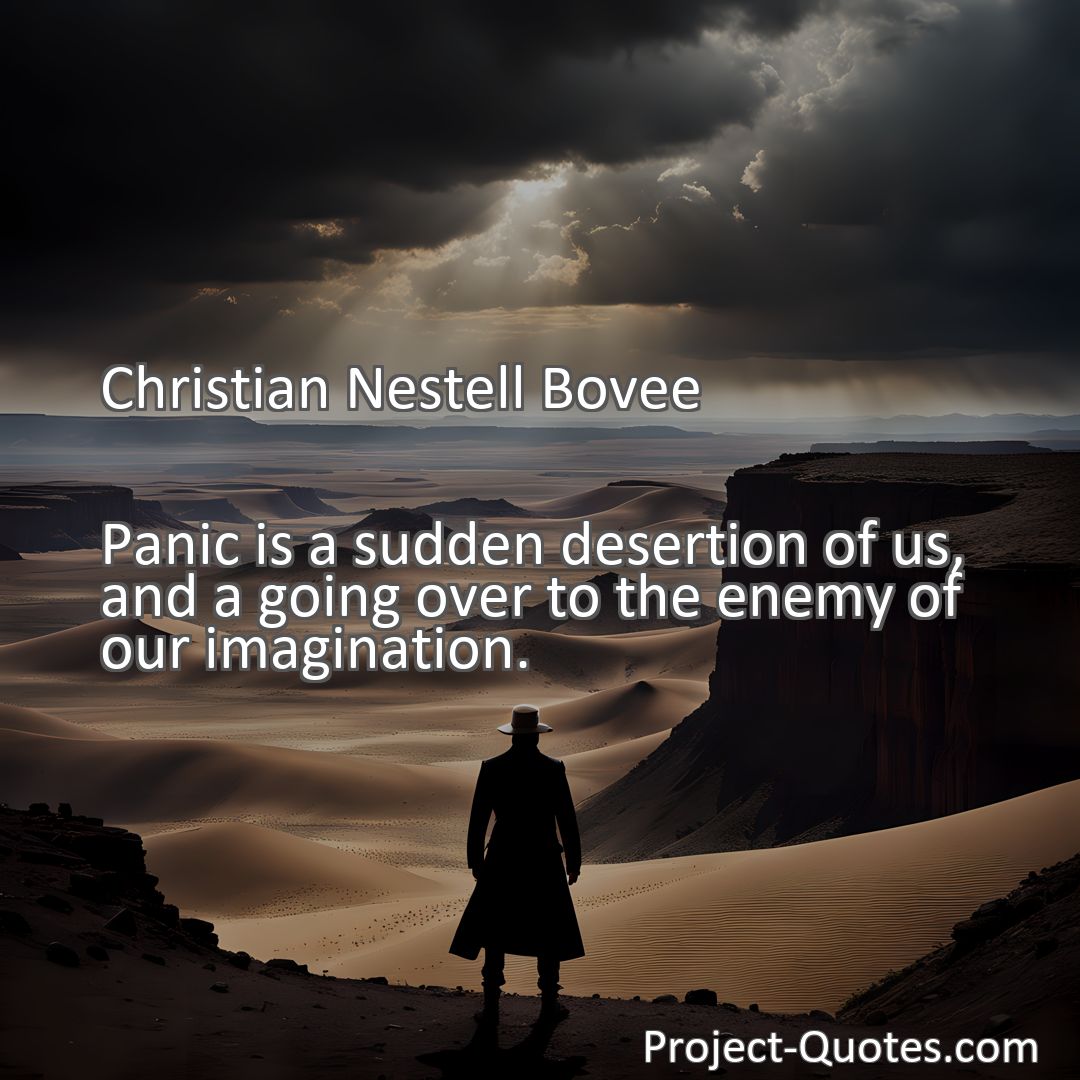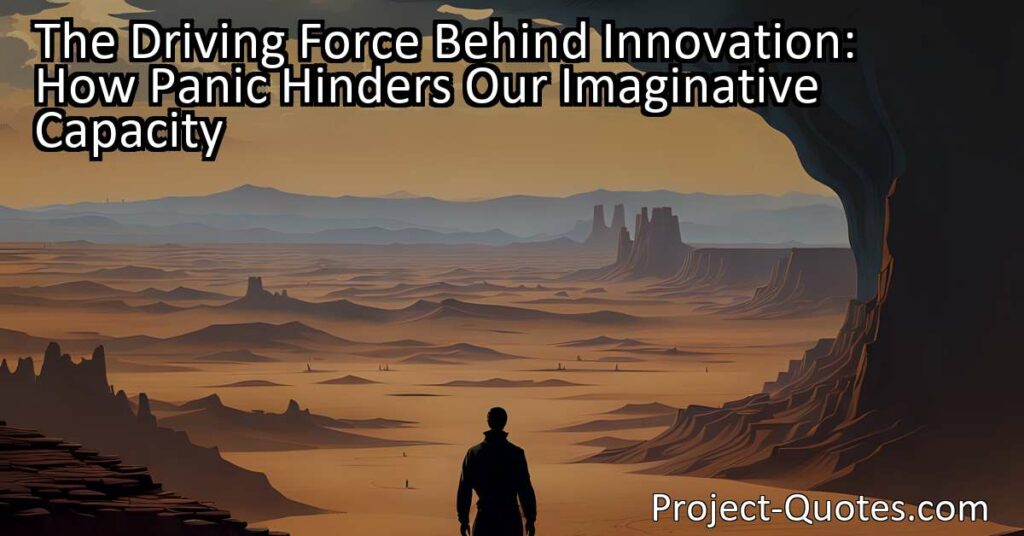Panic is a sudden desertion of us, and a going over to the enemy of our imagination.
Christian Nestell Bovee
The Driving Force Behind Innovation: How Panic Hinders Our Imaginative CapacityPanic can hinder our ability to think clearly and creatively, limiting our imaginative capacity. Understanding the impact of panic on our imagination allows us to take steps to regain control and unlock our creative potential through mindfulness and reframing techniques. By neutralizing the enemy of our imagination, we can become the driving force behind innovation in any situation.
Table of Contents
Meaning of Quote – Panic is a sudden desertion of us, and a going over to the enemy of our imagination.
Have you ever experienced that overwhelming feeling of panic? The sudden rush of fear that takes over your mind and body, leaving you feeling helpless and vulnerable? If so, you are not alone. Panic is a natural response to perceived danger or threat, but it can also be a powerful enemy of our imagination.
Christian Nestell Bovee, an American author, once said, “Panic is a sudden desertion of us, and a going over to the enemy of our imagination.” This insightful quote highlights the idea that panic can hinder our ability to think clearly and creatively, trapping us in a state of fear and anxiety. Let’s delve deeper into this concept and explore how panic affects our imagination.
Imagination is a remarkable human faculty that allows us to conceive new ideas, envision possibilities, and problem-solve creatively. It is the driving force behind innovation, art, and storytelling. However, when panic strikes, it can sabotage our imaginative capacity, leaving us mentally paralyzed and unable to tap into our creative potential.
Imagine you are faced with a challenging situation, such as delivering a presentation in front of a large audience for the first time. As the moment of truth approaches, you begin to feel your heart racing, your palms sweating, and a suffocating sense of panic takes hold of you. In this state, it becomes difficult to access your imagination and come up with innovative ways to engage your audience.
Panic has a way of narrowing our focus, making it nearly impossible to see beyond the immediate threat or danger. Our attention becomes fixated on survival, pushing aside any room for creative thinking. Our mind becomes preoccupied with worst-case scenarios, inhibiting our ability to think outside the box and explore alternative solutions.
Furthermore, panic has a tendency to distort reality. Our imagination, which is usually a source of inspiration and open-mindedness, becomes clouded by fearful thoughts and irrational beliefs. The enemy of our imagination, as Bovee describes it, takes over, fueling our anxieties and preventing us from embracing a more positive and expansive mindset.
Let’s return to the example of the daunting presentation. In a state of panic, our imagination could conjure up vivid images of stumbling over our words, the audience’s disapproving faces, and the potential humiliation that awaits us. These exaggerated mental pictures only intensify our fear and further limit our ability to tap into our creative potential.
However, it is crucial to recognize that panic is not an invincible force. It may feel overwhelming in the moment, but by understanding its impact on our imagination, we can take steps to regain control and unlock our creative thinking abilities.
One effective strategy is to practice mindfulness. Mindfulness involves cultivating a non-judgmental awareness of the present moment. By engaging in mindfulness exercises, such as deep breathing or body scanning, we can calm our racing thoughts and create space for clearer, more imaginative thinking.
In the case of the nerve-racking presentation, taking a moment to focus on our breath and ground ourselves in the present can help alleviate panic. Once we have regained a sense of calm, we can then direct our attention towards envisioning a successful and captivating delivery. This shift in mindset removes the obstacles panic had imposed on our imagination, allowing us to tap into our creative reservoirs once again.
Another useful tool for combating panic and revitalizing our imagination is reframing. Reframing involves changing the way we perceive a situation by shifting our thoughts and beliefs. It allows us to challenge the negative narratives that panic creates and replace them with more empowering and constructive ones.
To reframe the presentation scenario, we can remind ourselves that the audience is there to learn and support us, rather than judge and scrutinize our every move. By reframing our perception, we can rewire our imagination to focus on the positive outcomes and opportunities that lie within the experience. This opens the door for new and imaginative ideas to flow freely, ultimately enhancing the quality of our presentation.
It is worth recognizing that panic, despite its disruptive nature, is not inherently negative. It is a survival mechanism that evolved to protect us from real and immediate threats. However, in our modern world, panic often arises in response to situations that do not pose a genuine danger to our well-being. It is in these instances where panic becomes a hindrance to our imagination rather than its ally.
In conclusion, Christian Nestell Bovee’s quote reminds us of the detrimental effects panic can have on our imagination. When panic takes over, it hinders our ability to think creatively, trapping us in a cycle of fear and anxiety. To counteract this, we can leverage mindfulness and reframing techniques to regain control over our imaginative faculties. By doing so, we can neutralize the enemy of our imagination and unlock our full creative potential in any situation life throws our way.
I hope this quote inspired image brings you hope and peace. Share it with someone who needs it today!


